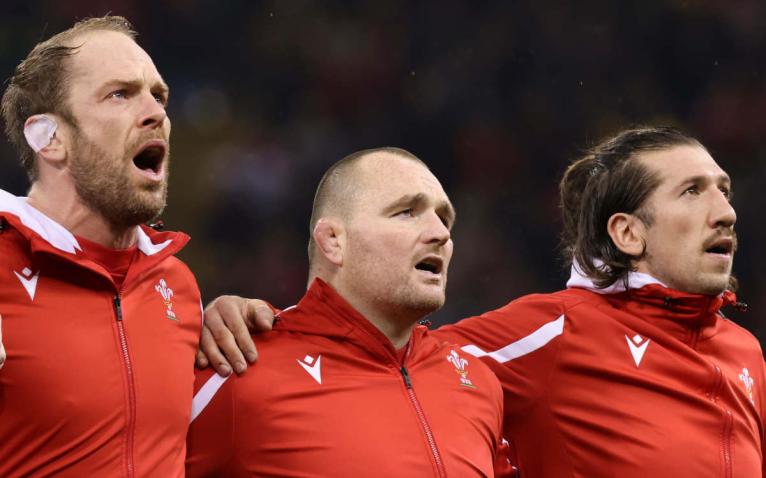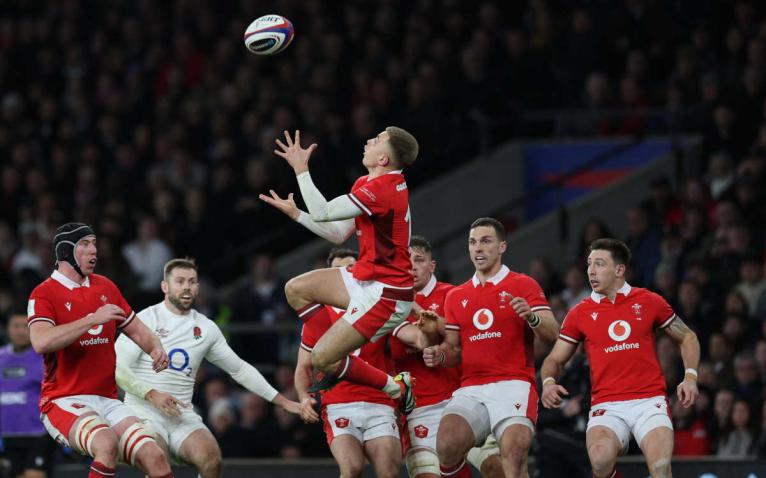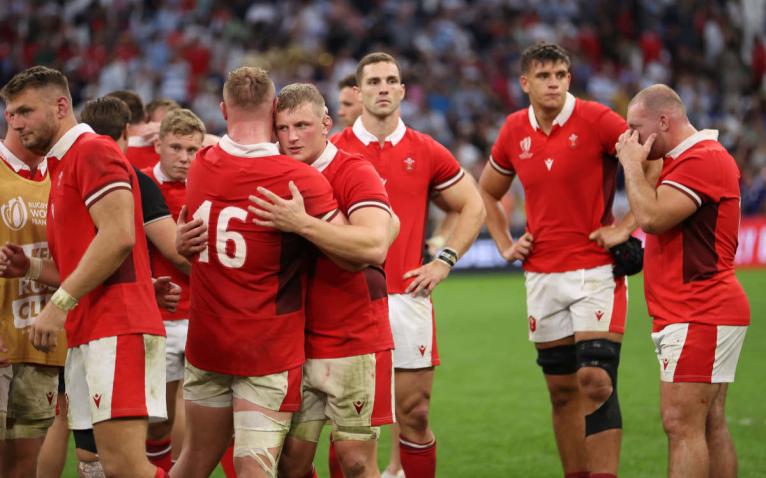If you’re on the outside looking in at Wales, you might look curiously in the direction of a side who have lost four of their matches – two heavily – and wonder why there are still pockets of optimism emanating from the rugby public. The narrative has been set and the dye cast that Wales are in a rebuilding-phase after a World Cup in which the general consensus was that they’d missed a golden opportunity to reach the semi-finals. This was underpinned by a listless few years in which sustained success has been hard to come by. Indeed their last Six Nations success came in 2021 under Wayne Pivac.
If we cross the Atlantic and look at American sports, drafts and salary caps force teams to constantly battle to keep winning teams together. At the outset, young players get modest contracts which in turn increase as they become successful. The net result is that owners need to make decisions about which player’s to keep and which to ship on at almost warp speed. Some teams will face a situation where their teams are packed with cost-heavy, ageing, and dare we say it, diminished talent. With precious little chance of success using players at their disposal, they may choose to raise the current crop to the ground, reseed, nurture and caress and see new shoots of recovery.
You might read that and surmise that it sounds very different to the challenges facing an international team. The salary cap being the obvious one. Yet international teams also have far fewer limitations on the players available to them. Theoretically, every qualified player playing anywhere in the world is available for them to select. If your current fly-half is injured, retires, or is just out of form, you can replace them with busload of players who are next in line. No need for complicated trades or salary cap rejigging. Yet, we regularly hear about countries starting from scratch, just like Wales are at the moment.

Ten months before the World Cup started, Wales ignominiously managed to snatch defeat from the jaw of victory against Australia. In that side they had Joe Hawkins, Justin Tipuric, Alun Wyn Jones, and Rhys Priestland. All would be retired or unavailable for selection by the time the World Cup came around. Louis Rees-Zammit and Dan Biggar would follow them from the team that exited the World Cup at the quarter-final stage. And Immanuel Feyi-Waboso, well, he’d choose the Red Rose of England. That’s a truckload of talent to lose, some of it in surprising circumstances…yes we’re looking at you, Louis, sunning it in Florida! Anyway, I disgress, it’s not a problem only Wales have faced or will face and while we can be sympathetic to their cause we can still surmise how they’ve reacted to the challenges at hand.
In the perfect rebuild you would seamlessly meld the outgoing and incoming player’s careers. Take Dan Carter who was introduced to the All Blacks in the summer of 2003, largely played second fiddle in the World Cup, and then supplanted Carlos Spencer during the 2004/2005 season, culminating in a performance from the Gods against the Lions in the second Test. George Ford will be 34 by the 2027 World Cup. If it’s decided that he is no longer going to be the starter for England then the obvious replacement will be Marcus Smith, someone who has already played 33 times for England and over 150 times for Harlequins. When Jack Crowley was thrust into Ireland’s ten shirt for the Six Nations, he did it off the back of 10 Irish caps and 47 Munster appearances.
When Wales turned to Cam Winnett, Alex Mann, and Mackenzie Martin they had a combined 32 appearance for their club sides. Evan Lloyd had six Cardiff caps and no starts. Tell me that doesn’t make a difference.
These are examples of smooth, seamless transitions. You can never be sure whether the new man will live with the blink-and-you’ll-miss-it pace of international rugby, but you can be pretty confident given they’ll have shown they can do the job in the tepid heat of domestic rugby. Indeed, when France shook up their selection with Léo Barré, Nicolas Depoorterè, Georges Henri-Colombe, and Emmanuel Meafou, all making their debuts against Wales, they did it safe in the knowledge that they had a substantial back catalogue showing they could compete. The quartet had 74, 30, 99, and 92 appearances for Top 14 sides. When Wales turned to Cam Winnett, Alex Mann, and Mackenzie Martin they had a combined 32 appearance for their club sides. Evan Lloyd had six Cardiff caps and no starts. Tell me that doesn’t make a difference.
Now Mann, Martin, and Winnett have all turned out to be players with promise. However, their fledgling international careers are beginning surrounded by players with a similar lack of experience. That is one of the key conditions of a well-planned rebuild; you can win stuff with a smattering of wunderkinds but you need to surround them with hard-earned nous. If you don’t, then you risk demotivating the next generation with dispiriting, soul-sapping losses. This is the perilous tightrope Wales are now walking.

Take Italy. They have had an uplifting couple of weekends, but their goal of picking youth, almost faceplanted before it began, with once promising careers falling by the wayside. Thankfully, the best youngsters managed to find roles in French or Italian clubs who were winning. Paolo Garbisi has won just nine of his 35 Italian matches but he’s got a 50 per cent win rate with Benetton and Montpellier. Michele Lamaro has 11 wins in 37 Italian matches but is 37 in 62 for Benetton. Compare that with Cam Winnett whose Welsh career has started with four straight losses and his Cardiff career currently has him sitting at three wins in 15.
It’s important to draw a distinction in this discussion between two factors; the plan and the execution. The execution is what Wales are currently delivering on the pitch. It’s patently not good enough to win but there are a fistful of positives in that side and they have young players doing better than we could ever have imagined. What’s gone wrong is the planning which has led to a point where players with barely any experience at club level are expected to play crucial roles rebuilding the national team. Who takes accountability for this is anyone’s guess? We’ve mentioned some of those surprise departures; Joe Hawkins, Louis Rees-Zammit but many have been entirely predictable. Players who may have gone a year later, like George North, but certainly wouldn’t have made it to the next World Cup.
Wales aren’t delivering the goods results-wise, yet the country is still packed with talent, with players like Morgan Morse, Louie Hennessey and Ryan Woodman, coming through
There are reasons to be cautiously optimistic in this rebuilding phase. Sam Costelow, Dafydd Jenkins, and Tommy Reffell all tick the requirements of what we want to see in a dream rebuild. They have 47, 41, and 110 club appearances respectively. Reffell and Jenkins are almost single-handedly pinning Wales’ defence together. Costelow has shown flashes to suggest he may be able to make the Welsh 10 jersey his own. It is concerning that Wales would turn their back on two of them if they re-signed contracts at their current clubs.
Wales aren’t delivering the goods results-wise, yet the country is still packed with talent, with players like Morgan Morse, Louie Hennessey and Ryan Woodman, coming through, but gelling it all together with a relatively bare cupboard is an almost impossible balancing act. It’s made significantly harder by a regional scene lacking stability, reduced salaries and poor results and the status-quo where there is red tape stopping them select young players who sign outside Wales if they’re under 25 caps. In short, Wales are in a bit of a pickle. Look at France, Ireland, South Africa, New Zealand. All are nations with similarly aged players in key positions who have maintained their competitiveness thanks to gradual reinvention.

England are undergoing their own reinvention. There are endless calls for them to pension off their older generation; ‘Care, Ford, Daly, and Cole must go’, chime the critics. ‘They have to make way for the young guns biting at their heels,’ they cry in unison. Yet Steve Borthwick is holding firm and gradually introducing that fresh-faced talent with a view on remaining competitive in 2024 and peaking for 2027. That evolution might be gradual but should ensure England don’t prop up the Six Nations table.
If you’re Welsh, maybe don’t read this final paragraph.
Nobody wants to consider the parlous state of Welsh rugby if they also fail to return to competitiveness in 21 years, with the 27-year wait for a Grand Slam in 2005, a reminder of a painful chapter in Wales’ history
In 2003 the Florida Marlins won the baseball World Series and almost immediately got rid of their high-value assets, trying to keep their wage bill down and rebuild with youth. Since then, they’ve made the play-offs just twice and won a single post-season game. For long stretches in the mid-2010s they were the poorest team in baseball.
Nobody wants to consider the parlous state of Welsh rugby if they also fail to return to competitiveness in 21 years, with the 27-year wait for a Grand Slam in 2005, a painful chapter in Wales’ history. There is no time to lose, Wales are playing catch-up.



Comments
Join free and tell us what you really think!
Sign up for free